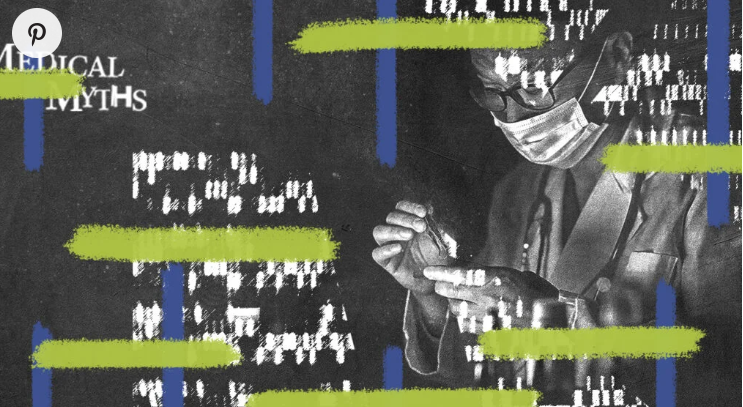Irritable bowel syndrome (IBS) is a chronic gastrointestinal disorder that affects around 11% of adults worldwide.
Symptoms include:
- abdominal pain
- excess gas
- bloating
- sudden, urgent need to use the bathroom
- changing bowel habits.
While relatively common, IBS is often misunderstood. To help us dispel some prevalent myths about this condition, we spoke with Dr. Ashkan Farhadi, a gastroenterologist at MemorialCare Orange Coast Medical Center in Fountain Valley, CA, and Dr. Mollie J. Jackson, a gastroenterologist at the University of Kansas Health System.
Dr. Farhadi told Medical News Today that although research is uncovering more about IBS, we still do not know what causes it.
While certain foods such as dairy products or spicy foods may trigger symptoms, they do not cause the condition.
He noted, however, that post-infectious IBS can be caused by bacteria such as Campylobacter jejuniTrusted Source.
In recent years, researchTrusted Source has suggested that levels of mental stress influence gut bacteria composition and play a key role in IBS via the gut-brain axis.
Dr. Farhadi says, however, that people with and without IBS generally face similar amounts of stress, meaning that it may be how people manage stress — rather than stress alone — that influences whether or not they may experience IBS symptoms.
“In my book on IBS, [I wrote about a study showing] that when a person is stressed, numbers of mast cells in their gut increase. So stress doesn’t just increase the release of hormones and mediators in the gut; it also changes the anatomy of the gut in a way that makes it more sensitive to stress,” he explained.
“This means that even if you come out of that stressful period, your gut is not the same gut you had before. IBS symptoms triggered by stress can thus linger even though the stress is gone. And this is very common in patients with IBS,” he added.
Dr. Farhadi also mentioned a studyTrusted Source he conducted that found that subjective perception of well-being is linked to fewer symptoms of IBS.
Previous researchTrusted Source has also suggested that psychological, social, and genetic factors may all play a role in the development of IBS symptoms.
“IBS can be diagnosed without fancy tests,” Dr. Farhadi told us. “With the right clinical criteria, doctors can diagnose IBS with 97% accuracy in 5 years. No other test in the medical field has that kind of accuracy.”
“We diagnose IBS based on the Rome IV criteria: Patients with IBS should report symptoms of abdominal pain at least once weekly — on average — in association with a change in stool frequency, a change in stool form, and/or relief or worsening of abdominal pain related to defecation,” explained Dr. Jackson.
“There are subtypes of IBS, and you may have predominantly diarrhea, constipation, or a mixed pattern. Patients often also experience bloating, but his symptom is not needed in making the diagnosis,” she added.
There are different ways of treating IBS, including a mixture of prescription medication and lifestyle changes tailored to each person’s individual situation.
“I can assure you in the overwhelming majority of cases, management is very cheap and simple: fiber, probiotics, reassurance, and exercise,” said Dr. Farhadi.
When it comes to medication, according to Dr. Farhadi, it can be a “trial and error” experience. However, it can help relieve the symptoms caused by IBS, alongside other interventions.
“Ultimately, there is no cure for IBS,” Dr. Farhadi noted, and sometimes medication may “only [work] like a bandaid for symptom relief. I have to repeat prescriptions for medications like management of bacterial overgrowth with antibiotics. Ultimately, there is no cure for IBS.”
“IBS is often a chronic, debilitating, and common disorder of the gut-brain interaction,” said Dr. Jackson.
Its “prevalence in North America is 10-15% and is associated with increased health care costs,” she emphasized, adding that “[I]t can significantly affect patients’ quality of life.”
“One studyTrusted Source highlighted the negative impact of IBS with patients reporting that they would give up 10–15 years of their life expectancy for an instant cure for their condition.”
While Dr. Farhadi agreed that some kinds of exercise do help IBS, he said that not all exercise is the same.
“Competitive exercise doesn’t relieve stress — it produces stress. The same is true for weight-lifting in the gym if you have to pay a lot of attention to what kind of weight you’re lifting, how you’re pulling this muscle, and how you’re pushing that muscle,” he noted.
He also said that many runners have what is known as “runner’s run,” or diarrhea after running for long periods. Thus, he warned, it is very likely that long periods of running can cause IBS symptoms to flare.

Thank you for your sharing. I am worried that I lack creative ideas. It is your article that makes me full of hope. Thank you. But, I have a question, can you help me?
Thanks for sharing. I read many of your blog posts, cool, your blog is very good.